We’re Building a Scenius
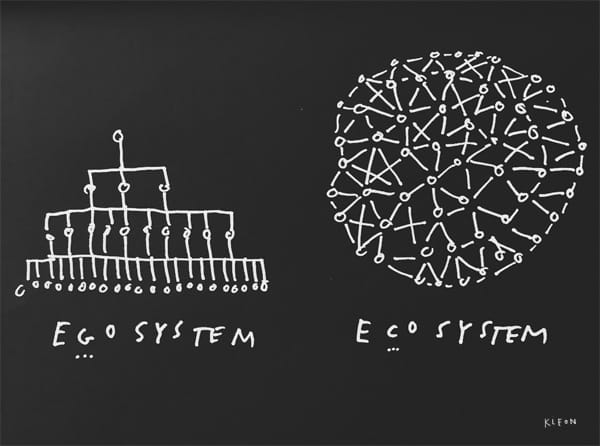
This is a message I shared on Guilford’s campus during our Community meeting worship time on 2023-12-05.
Revelation 7:9 After this I looked, and behold, ba great multitude that no one could number, from every nation, from all tribes and peoples and languages, standing before the throne and before the Lamb…
Hebrews 12:1 – “we are surrounded by so great a cloud of witnesses”
Moment of Silence
Introduction
When Meagan – our chaplain for students and multifaith coordinator – first asked me to come and share a message for the last community worship of the year, it was in the context of my upcoming Sabbatical that starts here in just a couple weeks.
I think the intention was to provide space for a bit of a farewell, maybe a bit of talking about what I’ll be doing on my sabbatical.
What has been on my mind is to share with you a bit of what my vision is and has been for my (and our) work on campus, and why my being gone might mean for all of you.
So I want to start with a weird question:
Are you a lone genius or do you have a scenius?
There’s this myth that’s been going around a long time that artists, genius, leaders, even theologians are supposed to be these lone geniuses, fueled by ego.
You know the ones I’m talking about.
They squirrel away out of site in their ivory tower, or an undisclosed location off the coast of France and after a few years they emerge victorious – manuscript or painting in hand.
“A revelation!” The people say. Everyone marvels at their brilliance, ready to make a statue in their honor.
And while we all clap, inside we feel a little deflated.
“I could never be someone like that.”
Or “I could never create something like that.”
We might think: “They will never build a statue in my honor.”
Parents of young children say to themselves, “I wish I could get 10 minutes by myself just to go to the bathroom, let alone be a lone genius with no worldly responsibilities!”
The singular figure. The superhero. The sage on the stage. The person on a pedastool are all ways of imaging what I’m talking about – this image of the lone genius.
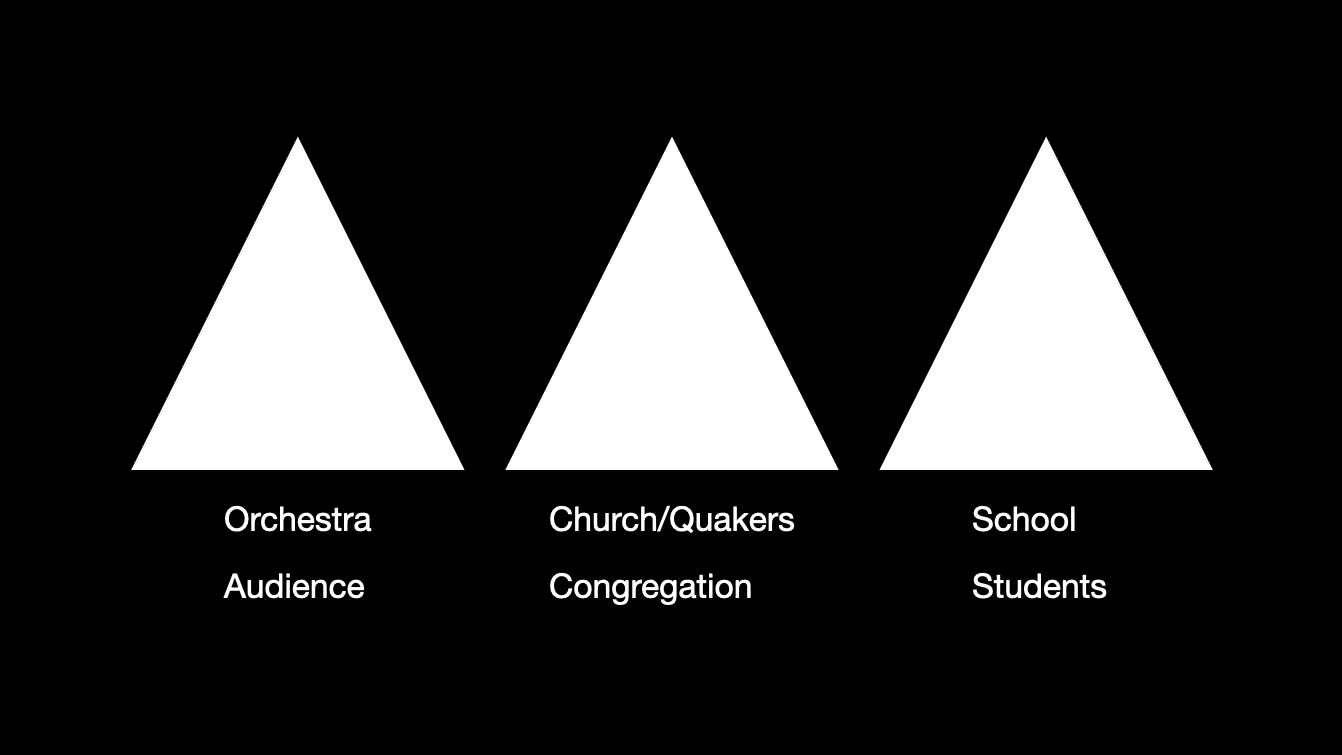
Musician, Brian Eno, when illustrating a traditional model of genius draws a picture of a:
symphony orchestra, with God or the Muse at the very top of the triangle, and on descending levels, the composer, the conductor, the musicians, and, finally, the audience listening.
Austin Kleon
The composer, the lone genius closest to God, is at the top of the triangle. In this model, Art, like economics, is apparently trickle down.
A lot of other parts of society can often feel like this.
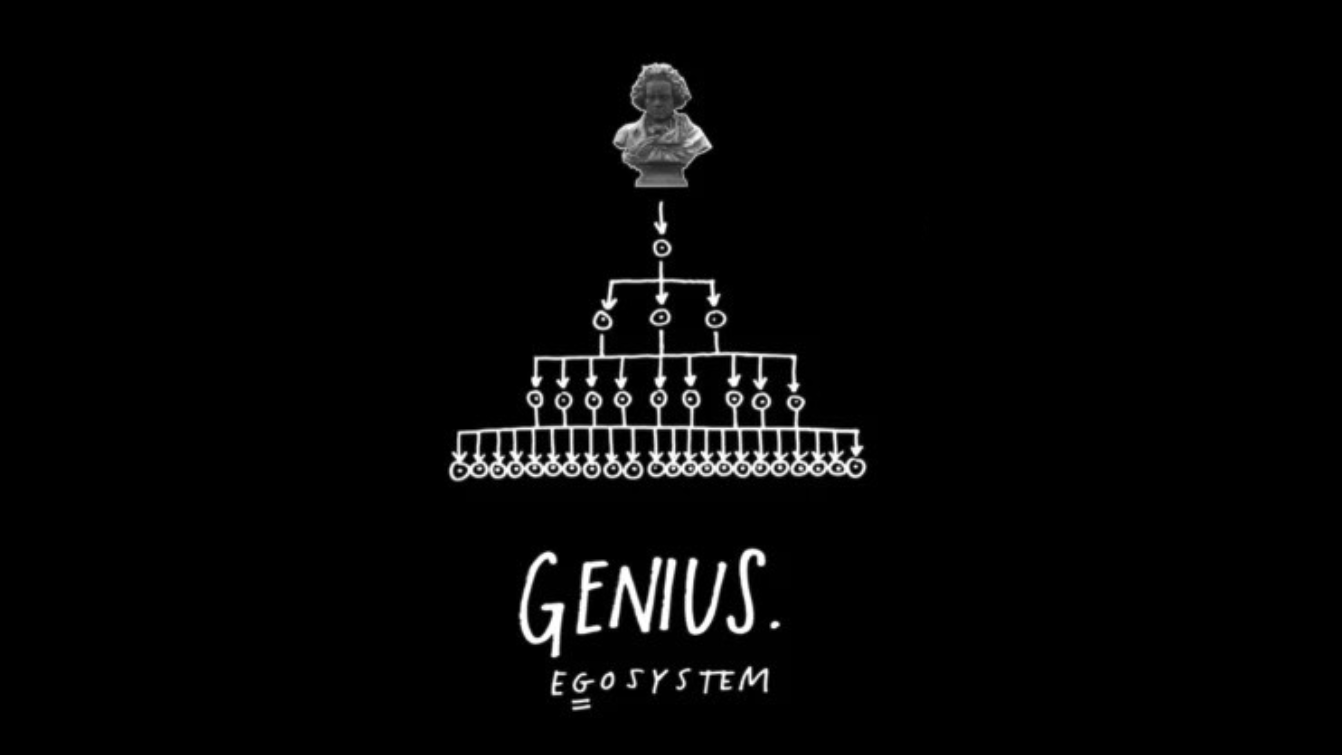
Austin Kleon – who I got this idea and these images from writes:
Our world is an ecosystem in which our only real chance at survival as a species is cooperation, community, and care, but it’s being lead by people who believe in an egosystem, run on competition, power, and self-interest.
See Further Notes on Scenius
I see this all around me. From social media influencers, to political and religious leaders, to authors, activists, and educators we put on pedastools, it can even be expressed in forms of Quaker exceptionalism.
The lone genius shows up in all kinds of ways.
Kleon says another word for Lone Genius is the ego-system. It’s all about me and building me up. In the ego-system, it’s all up to me to save things, to be the expert, the be the sage on the stage, the one who has to be right. Only the Lone Genius has the answers to save us. We poor peseants could not work it out for ourselves.
In this model: without the lone sage, there is a void.
Queries:
- How many of you have seen or been subject to the idea that all genius are a little like this?
- Can you think of artists, authors, preachers, theologians, or other personal heros you hold at the top of a triangle like this?
Build A Scenius
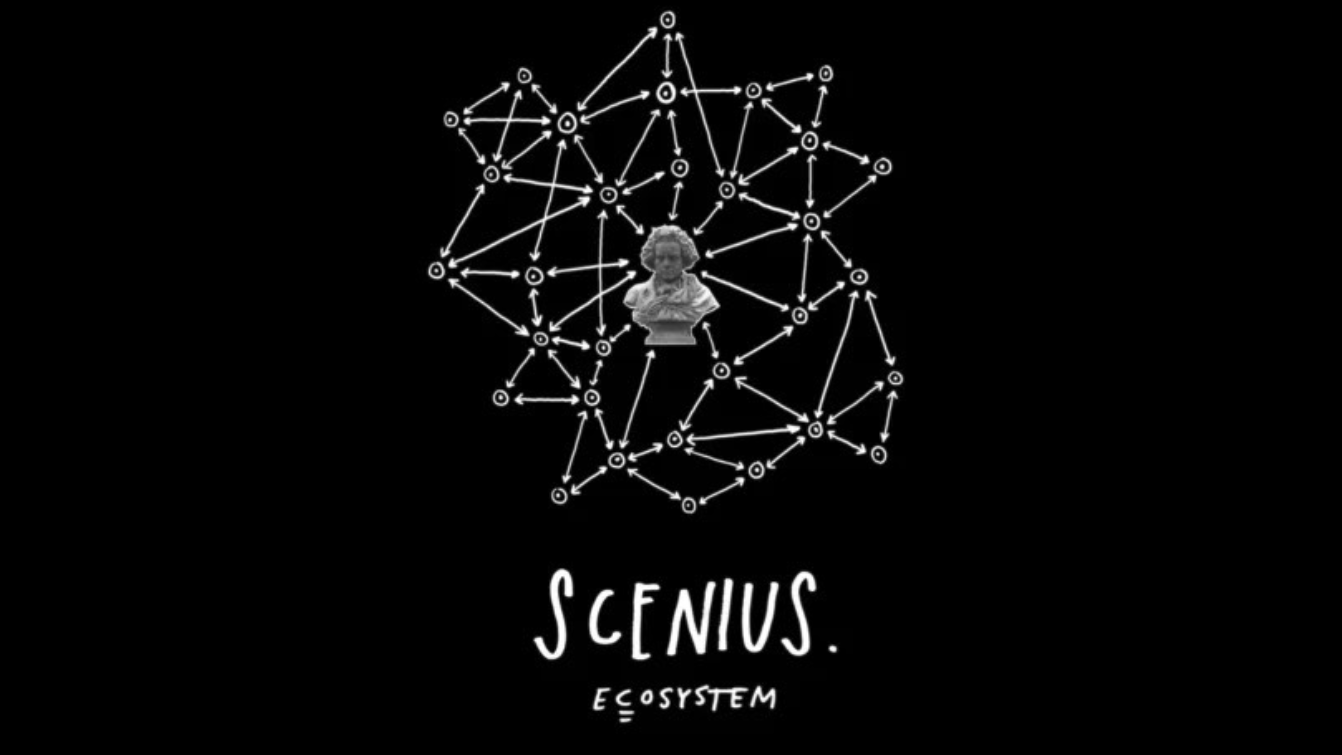
There is an alternative to the image of the lone genius that I find inspiring.
This is what Kleon says in his book, “Show Your Work,”
There’s a healthier way of thinking about creativity that the musician Brian Eno refers to as “scenius.” Under this model, great ideas are often birthed by a group of creative individuals—artists, curators, thinkers, theorists, and other tastemakers—who make up an “ecology of talent.” If you look back closely at history, many of the people who we think of as lone geniuses were actually part of “a whole scene of people who were supporting each other, looking at each other’s work, copying from each other, stealing ideas, and contributing ideas.”
Austin Kleon – Show Your Work (also online here).
Kleon continues:
[Slide] What I love about the idea of scenius is that it makes room in the story of creativity for the rest of us: the people who don’t consider ourselves geniuses. Being a valuable part of a scenius is not necessarily about how smart or talented you are, but about what you have to contribute—the ideas you share, the quality of the connections you make, and the conversations you start. If we forget about genius and think more about how we can nurture and contribute to a scenius, we can adjust our own expectations and the expectations of the worlds we want to accept us. We can stop asking what others can do for us, and start asking what we can do for others.
To put it even more simply: Genius is an egosystem, scenius is an ecosystem.
In another place he puts it succintly like this: Scenius is like genius, only embedded in a scene rather than in genes.
I really love this.
First, I love this vision of our work together. We are not here in order that someday there will be a building named after us, we are here to contribute to an ecosystem, an unfolding narrative of cooperation and community.
If anything, I see my work as being here to contribute to and help nurture the scenius that is already here. Not only does this feel more natural to my own personality, but it helps me rely on the gifts and wisdom of everyone else, and helps me to see that it’s not all up to me or any one other person.
The goal for each of us in this vision of the scenius is simple, how are we adding to the ecosystem? And can you see and appreciate the other parts of it that may not be our own?
You are the entire ecosystem. Nor are you responsible for the whole thing. All you have to do is carry out your part as best as you can.
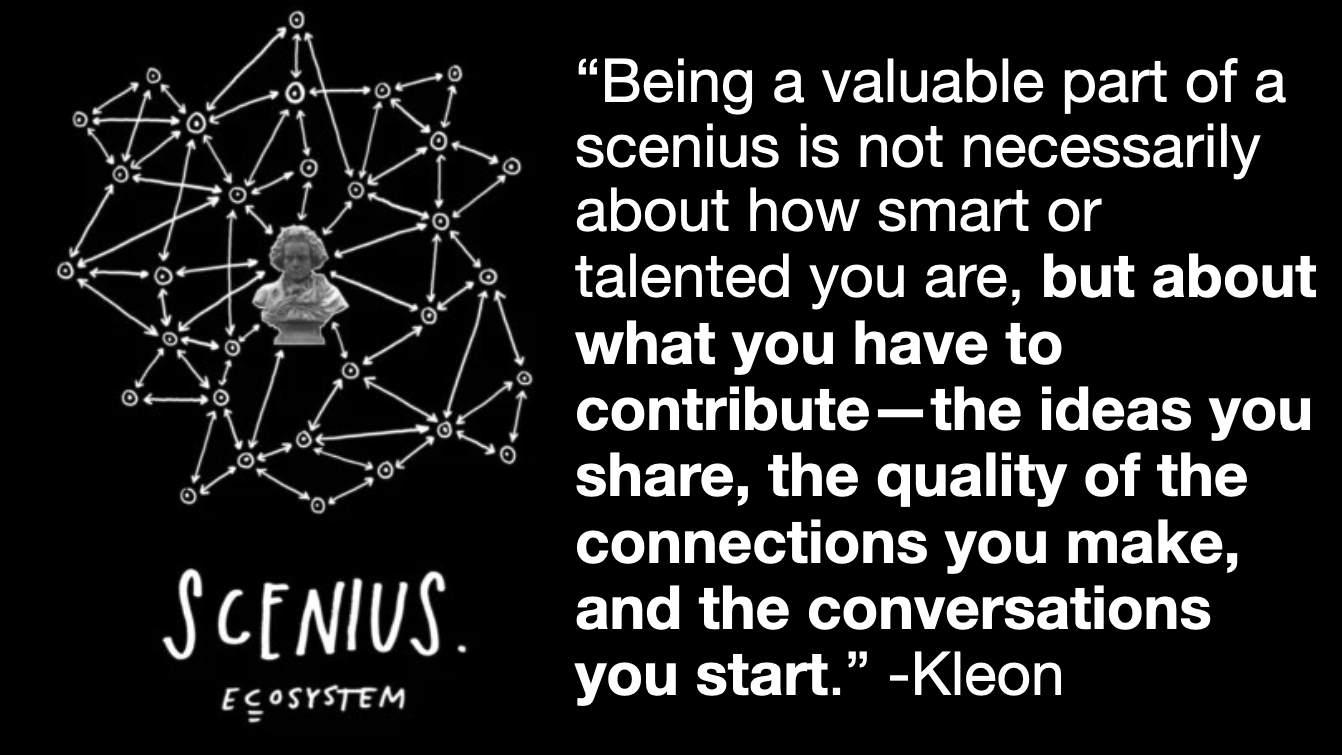
The idea of a Scenius is also a solid image of what spiritual community is to be like. We should always exercise caution when spiritual communities mirror the lone genius model. Martin Luther King, Jr called scenius the beloved community. Quakers call it Gospel Order. In the New Testament it can be seen in reference to the Multitude found in Revelation a vision that is multinational, multilingual, and multiracial in its makeup, the Cloud of Witnesses in the book of Hebrews, and in the mass gatherings of poor people Jesus organized. In the Hebrew Bible, we see it in what exodus calls the “Hebrews.” The word “Hebrews” meant the poor, dispossessed, the people enslaved by empire, it was a composite of people groups across the nations that Egyptian Empire conquered and enslaved. Those people shared stories, passed on ways of survival, and eventually together were liberated from empire by members of their own community: Moses, Aaron, and Miriam.
Seeking Our Collective Wisdom
Why am I saying all of this now:
As I go onto sabbatical, I have no worries or concerns of what things will be like in my absence, because I see all of you and all of what we have as a scenius.
Our work is to accompany each other and Guilford as she continues to evolve and change and support this scenius in ways that often go unnoticed and unrecognized. It is not in the recognition that makes something valuable, it’s in the connections that get made, and in the flow of ideas, conversation, and the love that is shared.
It is not my work, or our work, to be lone experts but instead to be building the beloved community rooted in our collective wisdom of those here now while continuing to keep ourselves in conversation with the older wisdom tradition that Guilford is a part of.
I believe in each of you. I trust that which you have and that which is among you. I love each of you.
And I know that if I have done well at living into this vision scenius that the space left behind will be held well and will not feel like an absence at all but a different kind of presence in the scenius.
For our silence and responding time I have a question for you:
What does your scenius look like right now? Who are those cloud of witnesses surrounding you, “supporting each other, looking at your work, contributing to your ideas,” and who you too are helping to nurture.” Take some time to draw this out with the materials provided.